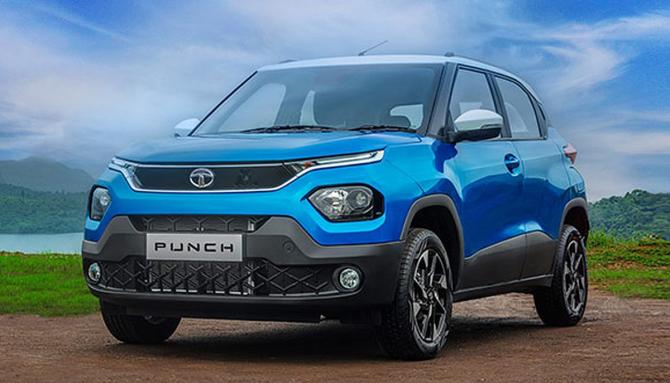The semiconductor shortage has chipped at the sales of most passenger vehicle (PV) makers, but Tata Motors has bucked the trend.

The Tata group flagship has sold more sport utility vehicles (SUVs) in the domestic PV market in the past four months than any other automotive manufacturer, cementing its no.1 spot.
It first grabbed pole position in the SUV segment in October 2021 after the launch of the Punch - a sub-compact SUV offering.
Zipping past Hyundai Motor India, which was the largest until a few months back, Tata Motors’ SUV sales jumped to 96,833 units from October 2021 to January 2022, from 37,242 units in the corresponding period last year.
Its market share in the SUV segment stood at 22 per cent in the December quarter of 2021-22 (FY22), compared to the fourth quarter of 2020-21.
The sales comparison with rivals excludes multi-purpose vehicles, such as Maruti Suzuki's Ertiga and the XL6, and Toyota Innova. Year–to-date (April to January), Tata Motors' share is close to 17 per cent. It envisages ending the financial year with 19-20 per cent, said Rajan Amba, vice-president-sales, marketing, and customer care, Tata Motors.
Amba is confident that even as Tata Motors has no new (internal combustion engine) model lined up in 2022-23, it will be able to sustain the current sales momentum from the line-up of existing models.
“You may say there are no new models, but we will be coming up with some interesting production interventions as we go along,” said Amba.
The company will be able to leverage the mileage from the Punch launched in the December quarter, he said, adding that the 'dark edition' continues to do well and the recently launched Kaziranga edition, too, has been well-received.
India’s PV market is getting sharply defined, based on body type and price, spawning new sub- segments, said analysts.
As a result, many crossover vehicles are being defined as SUVs.
Such models meet basic criteria, such as body type, ground clearance, and high seating, but fall short on the performance metrics.
SUVs, including crossovers, now account for 42 per cent of PV sales.
“The high unit sales of the Punch conform to the trend that customers are favourably inclined due to the price point being attractive,” he pointed out.
Tata Motors has been reaping the benefits of a refreshed product portfolio for some time now, but it’s the Punch that has helped it catapult to the no.1 position in the segment.
With average monthly sales at 10,000 units, the small sub-compact SUV - that competes with the Suzuki Ignis and the Mahindra KUV1OO - has emerged as the latest volume-spinner for the company.
It has helped the firm gain momentum month-on-month, with average monthly sales of SUVs increasing from 10,000 units in the first quarter of FY22 to 13,500 in the second quarter to over 22,000 in the third quarter. In January 2022, it sold 28,108 units.
Seven out of every 10 PVs sold by Tata Motors come from SUVs.
“There is now a real connection with consumers. That is what will take us through.
"Therefore, the next financial year is going to be as exciting as the current one,” said Amba.
The SUV line-up has seen a lot of traction around mid- to high-level trims.
On average, the two trims account for 65-70 per cent of the sales mix, an indication of the growing acceptance of the brand, he added.
Updating on the semiconductor availability, Amba said most manufacturers have reset their ways and have not let it hobble the industry, at a time when a global chip crunch and a pandemic-driven parts shortage forced production cuts.
Automakers have found a way around to keep their production lines running — cutting down on the usage of microchips in their vehicles.
Whether buying computer chips directly from manufacturers, reconfiguring cars, or producing them with parts missing, automakers are having to get creative to cope with the global shortage of semiconductors.
He expects the shortage to ease by the end of the current calendar year.
Tata Motors has been able to do some re-engineering in the product portfolio.
This has helped it manoeuvre the shortage, he added.










